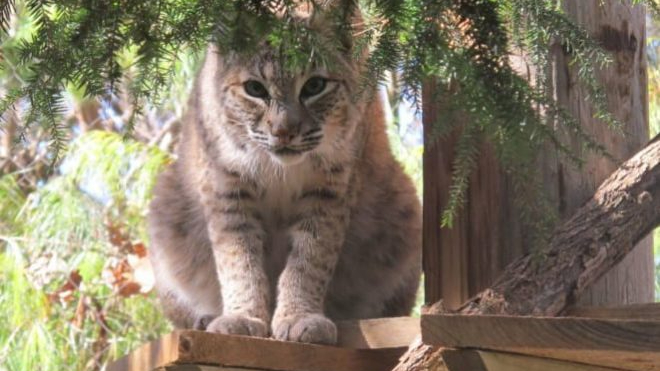
WNC Nature Center celebrates new animals added in 2023
Asheville -- November 2023: Guests visiting the WNC Nature Center this spring and summer have seen many new animals!
Over the past six months, 19 animals representing seven species have been born or brought to the Nature Center.
In late April, the WNC Nature Center announced the birth of a large litter of critically endangered red wolf puppies. Six females (Babs, Bonnie, Ruby, Rufina, Sienna, and Toto)and one male (Tony) have grown up in front of guests and visitors and are now almost indistinguishable in size from their parents, Gloria and Oak. The WNC Nature Center anticipates that the red wolf pups will remain in Asheville for the next two years.
On the heels of the red wolf births came two coyote pups, Cal and Walker. They were also born in April and came to the Nature Center in late July from Izzie’s Pond Sanctuary in South Carolina. While Cal and Walker are not biological brothers, they were introduced to each other at a very young age, so they have bonded and will be companions. These coyotes are incredibly shy and are usually spotted by guests behind their open den shelter.
Quickly becoming a guest-favorite, bobcat kitten Tufts joined the Nature Center in early August. He came from the May Wildlife Rehabilitation Center in Banner Elk, North Carolina, and was named after Edgar Tufts, the founder of Lees-McRae College. The latest bobcat addition was Kohana in late November, a female bobcat who was found in the wild by the West Virginia Department of Natural Resources, she was born around the same time as Tufts, and the two will
be non-breeding companions.
Raccoons Grace and Frankie came to the WNC Nature Center in late September from Appalachian Wildlife Refuge. These kits have acclimated quickly with their curious behaviors and tactile foraging skills.
In our Care
To say the least, animal keepers and the veterinary care team at the WNC Nature Center have been busy keeping up with vaccines and immunizations, introducing the animals to their new habitats, and encouraging behaviors that will help with their care as they grow into adulthood.
“When you visit and see our animals, it’s important to understand why they are here with us,” says Erin Oldread. Animal Curator at the Nature Center. “Sometimes they were born under human care, like our red wolves. Other animals were permanently injured in the wild and need ongoing veterinary care. In the case of our new coyotes, bobcats, and raccoons, they were found to be unreleasable by the sanctuaries who received them. Oftentimes when you are rehabilitating a very young animal and feeding them from a bottle, they very quickly become dependent on and overly comfortable around humans. It can be harmful to them and humans if they were released back into the wild, so the WNC Nature Center is happy to give them a home.”
In the case of WNC Nature Center’s last collection of baby animals, sometimes the Center serves as a holding ground as animals develop and prepare to be released back into the wild. Appalachian Station, the Nature Center’s indoor exhibit for reptiles and amphibians, is currently housing two baby box turtles and two baby snapping turtles, all four of which are overwintering and will be released in spring 2024.


 How to resolve AdBlock issue?
How to resolve AdBlock issue? 